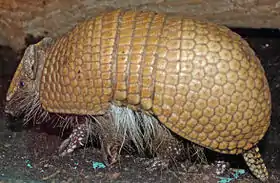Щитоносцеві
Щитоносцеві (Chlamyphoridae) — родина неповнозубих ссавців. Родина містить 8 родів і 14 сучасних видів[1].
| Щитоносцеві | |
|---|---|
 | |
| Tolypeutes matacus | |
| Біологічна класифікація | |
| Царство: | Тварини (Animalia) |
| Тип: | Хордові (Chordata) |
| Клас: | Ссавці (Mammalia) |
| Ряд: | Броненосці (Cingulata) |
| Родина: | Щитоносцеві (Chlamyphoridae) Bonaparte, 1850 |
| Типовий рід | |
| Chlamyphorus Harlan, 1825 | |
| Підродини | |
| |
На основі морфологічних і молекулярних даних було знайдено, що всі сучасні броненосці, крім Dasypus мають бути розміщені в новій сестринській родині Chlamyphoridae[2][3][4][5][6][7].
Сучасний склад родини
Родина Chlamyphoridae
- Підродина Chlamyphorinae
- Рід Calyptophractus
- Calyptophractus retusus
- Рід Chlamyphorus
- Рід Calyptophractus
- Підродина Euphractinae
- Рід Euphractus
- Euphractus sexcinctus
- Рід Zaedyus
- Zaedyus pichiy
- Рід Chaetophractus
- Chaetophractus vellerosus
- Chaetophractus villosus
- Chaetophractus nationi
- Рід Euphractus
- Підродина Tolypeutinae
Примітки
- Mammal Diversity Database. American Society of Mammalogists. Процитовано 13.01.2022.
- Simpson, G. G. (1945). The principles of classification and a classification of mammals. Bull. Amer. Museum Nat. History., 85.
- Grassé, P. P. (1955). Ordre des édentés. Traité de zoologie 17 (2): 1182–1246.
- Engelmann, G. F. (1985). The phylogeny of the Xenarthra. The evolution and ecology of armadillos, sloths, and vermilinguas. Smithsonian Institution Press, Washington, DC, 51-64.
- Wible, J. R. (2006). 6 The Phylogeny of Living and Extinct Armadillos (Mammalia, Xenarthra, Cingulata): A Craniodental Analysis. Amniote Paleobiology: Perspectives on the Evolution of Mammals, Birds, and Reptiles: University of Chicago Press, Chicago, IL, 153-198.
- Delsuc, F.; Gibb, G. C.; Kuch, M.; Billet, G.; Hautier, L.; Southon, J.; Rouillard, J.-M.; Fernicola, J. C.; Vizcaíno, S. F.; MacPhee, R. D. E.; Poinar, H. N. (22 лютого 2016). The phylogenetic affinities of the extinct glyptodonts. Current Biology 26 (4): R155–R156. PMID 26906483. doi:10.1016/j.cub.2016.01.039.
- Gillian C. Gibb; Fabien L. Condamine; Melanie Kuch; Jacob Enk; Nadia Moraes-Barros; Mariella Superina; Hendrik N. Poinar; Frédéric Delsuc (2016). Shotgun Mitogenomics Provides a Reference Phylogenetic Framework and Timescale for Living Xenarthrans. Molecular Biology and Evolution 33 (3): 621–642. PMC 4760074. PMID 26556496. doi:10.1093/molbev/msv250.
This article is issued from Wikipedia. The text is licensed under Creative Commons - Attribution - Sharealike. Additional terms may apply for the media files.